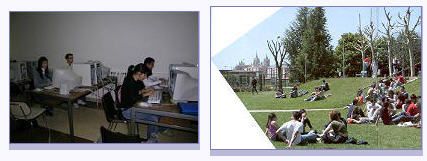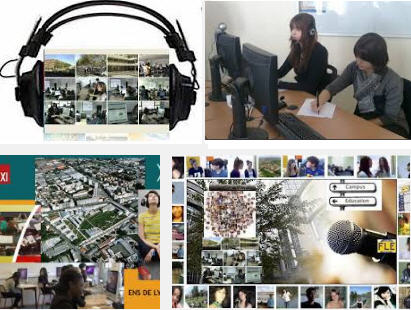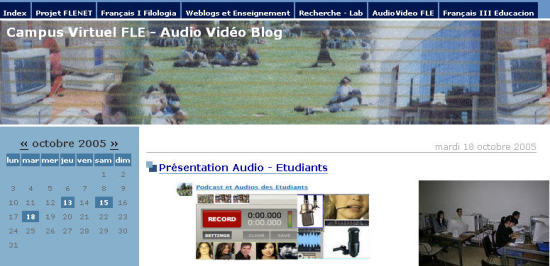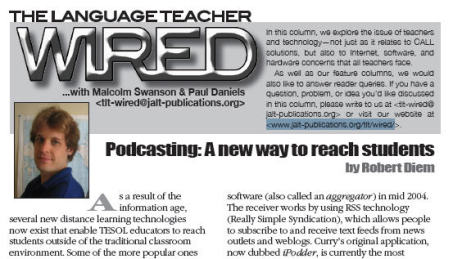Langues - Communication - Ressources - Projets - Web 2.0
Les premières expériences et recherches sur l'application du podcasting dans l'enseignement des langues (Mochizuki 2004, Diem 2005, McCarty 2005, Godwin-Jones 2005, Chinnery 2006) abordent les outils, mode d'emploi et possibilités pédagogiques de cette nouvelle technologie. Les enseignants introduisent des audio blogs en classe (compréhension orale) et les étudiants sont équipés d' iPods (Duke University), mais on ne conserve pas de témoignages de leurs productions orales.
Les premières productions orales disponibles en ligne ont été réalisées en octobre 2005 dans un cours de français langue étrangère à l'Université de León (Espagne), en utilisant Podomatic Audio Carnet FLE 2005-06 ainsi que dans la cadre du projet de télécollaboration León-Grenoble.
G.Stanley (2006) souligne la motivation des
apprenants à l'heure de créer leurs propres podcasts et les
potentiels d'interaction orale pour des projets de
télécollaboration. J. McQuillan (2006) constate les
nombreux materiels audio qui fournissent les iPods pour
l'acquisition d'une langue étrangère, ainsi que leur
potentiel d'enregistrement chez les apprennants:
The possible applications of this function are numerous. For
teachers, it is possible to record additional audio input,
classroom presentations, narrated stories, and other
instructional material. Students can record themselves and
classmates for a classroom assignment and provide speech
samples to the teacher for assessment. (...) Students can
also use the iPod to interview native speakers for use with
another successful teaching strategy, “narrow listening.”
Narrow listening involves listening to several audio
recordings on the same or a similar topic, recorded by
different speakers of the target language.
J.Rosell-Aguilar (2007), D.J.Young (2007) et A. O’Bryan & V.Hegelheimer (2007) relèvent les avantages et trasformations pédagogiques du podcasting pour les cours de langue étrangère. Mais G. Lord (2008) reconnaît: "Surprisingly, however, there is little information in the literature about how technological tools can be used to teach pronunciation". Enfin M.Tomé (2007) expose ses recherches sur les applications du podcasting pour le développement des compétences orales, en privilégiant les enregistrements audio et les tâches de production orale, comme la lecture à voix haute, des exercices d'écoute et répétition ou la création de séquences audio chez les apprenants de français langue étrangère.
RÉFÉRENCES BIBLIOGRAPHIQUIES
Chinnery, G. M. (2006) Going to the MALL: Mobile assisted
language learning. Language Learning & Technology,
10(1), 9-16. http://llt.msu.edu/vol10num1/emerging/default.html
Diem, R. (2005). Podcasting: A new way to reach students.
The Language Teacher, 29 (8), pp. 45-46. http://jalt-publications.org/tlt/issues/2005-08_29.8
Godwin-Jones, R. (2005) Skype and Podcasting: Disruptive
Technologies for Language Learning. Language Learning &
Technology, 9/3, septembre 2005, pp.
9-12. http://llt.msu.edu/vol9num3/pdf/emerging.pdf
McQuillan, J. (2006) IPod in education: The potential for
language acquisition. White Paper.
http://images.apple.com/ca/education/docs/leaders/Apple-iPodLangAcq...
McCarty, S. (2005) Spoken Internet To Go: Popularization
through Podcasting. JALT CALL, 1(2), 67-74. http://www.waoe.org/president/podcasting_article.html
Mochizuki, T. (2004) Apple’s iPod is taking campuses by
storm. The Nevada Sagebrush. http://ipod.gcsu.edu/zzzzMedia/Press_Articles/TheNevadaSagebrush.pdf
O’Bryan, A. & Hegelheimer, V. (2007) Integrating CALL into the classroom: the role of podcasting in an ESL listening strategies course. ReCALL, 19/2, pp. 162-180 http://www.postgradolinguistica.ucv.cl/dev/documentos/90,917,Integr...
Rosell-Aguilar, F. (2007) Top of the Pods - In Search of a
Podcasting "Podagogy" for Language Learning; Computer
Assisted Language Learning Vol. 20, No. 5, pp. 471-492. http://students.kennesaw.edu/~ppeoples/Podcasting%20For%20Language%...
Stanley, G. (2006). Podcasting: Audio on the Internet Comes
of Age. TESL-EJ, 9(4). http://tesl-ej.org/ej36/int.html
Tomé, M. (2007) Applications pédagogiques des weblogs dans
le Campus Virtuel FLE, Estudios Humanísticos - Filología, Nº
29, 341-373. Universidad de Léon. En ligne sur Revue
Tourdetoile, 10: http://flenet.rediris.es/tourdetoile/Tome_BlogsCampusEH07.html
Voir aussi: Recherches et expériences dans les blogs du
Campus Virtuel FLE, Çédille.Revista de estudios
franceses, nº 3 (abril 2007), pp. 265-268. http://cedille.webs.ull.es/tres/tome.pdf
Young, D. J. (2007) IPods, MP3 players and podcasts for FL
learning: Current practices and future considerations.
NECTFL Review, 60, 39-49. http://www2.dickinson.edu/prorg/nectfl/review60.pdf
Les premiers témoignages disponibles en ligne sur la blogosphère où l' on peut écouter les voix et productions orales des étudiants ont eu lieu en octobre 2005 sur le Campus Virtuel FLE de l'Université de León (Espagne), dans le contexte d'un cours de français langue étrangère (2ª Lengua y su Literatura Francés I), ainsi que dans la cadre du projet de télécollaboration León-Grenoble.
POUR CONSULTER CET HISTORIQUE DES PREMIERS PODCASTS
ET PRODUCTIONS ORALES DES ÉTUDIANTS DU CAMPUS
VIRTUEL FLE
APPRENTISSAGE DES LANGUES - FLE (Français Langue Etrangère):
Octobre 2005: Premiers podcasts FLE des étudiants dans Audio Carnet FLE 2005-06 (Podomatic)
http://campus6.podomatic.com/ Archive - RedIRIS
Premier Podcast - Historique: 14 October 2005:
Ecoutez le fichier audio: Alicia_Presentation.mp3 Message Moodle Alicia présentation
Projet de télécollaboration Universite de León et Université de Grenoble
Historique:18-10-05: Podcasts des étudiants sur Audio Video Blog Campus FLE :
Message Présentation Audio Etudiants Post Blog: Dialogue Dani et Jesus
Historique 30-10-2005: Message Correction de la prononciation -
Podcasts des étudiants :Sara, Monica, Sergio,
Patricia. Consultez ces messages et enregistrements
audio en ligne sur Audio Carnet FLE 2005-06
http://campus6.podomatic.com/
D'AUTRES PISTES, RÉFÉRENCES ET RESSOURCES
dans les COMMENTAIRES de ce message...
Vues : 856716
Commenter
-
 Commentaire de Aisha
Commentaire de Aisha -
Les nouveaux médias et réseaux du Web actuel se répandent progressivement dans le monde de l’éducation. Pour l’enseignement d’une langue étrangère leurs potentiels restent encore à explorer, tout particulièrement ceux en relation avec le développement des compétences orales chez les apprenants. Dans cet article nous présenterons les expérimentations réalisées avec les réseaux et les médias sociaux en classe de français à l’Université de León en Espagne. Nous avons élaboré des tâches pédagogiques et des projets de télécollaboration en intégrant des podcasts (baladodiffusion), des weblogs et des réseaux sociaux avec l’objectif de favoriser les productions orales et écrites des étudiants, ainsi que la collaboration et les échanges interculturels. Notre action-recherche se centre sur les productions orales et sur la correction de la prononciation, car nous considérons que ces pratiques ont été traditionnellement négligées en classe de langues et nous croyons que les potentiels des médias et des réseaux sociaux peuvent transformer cette situation ainsi que développer les compétences orales et la correction de la prononciation dans de nouvelles situations d’échange et de collaboration.
Des expérimentations axées sur l’apprentissage de la prononciation et spécialement sur les productions orales des apprenants de français langue étrangère. Elles ont été enregistrées sur différents supports informatiques (fichiers mp3 ou wav, podcasts ou audiblogs en ligne, séquences vidéo en format flv ou avi). Les tâches et les productions orales signalées dans cette étude sont disponibles en ligne sur les espaces Web : PROJET ORAL FLE PRONONCIATION
Afin d’évaluer la réaction et l’opinion des étudiants face aux médias et aux réseaux sociaux utilisés, ainsi que face aux tâches et aux méthodes de production orale et de correction de la prononciation proposées, on a réalisé, les dernières années, trois types de questionnaires semi-directifs : Questionnaire compétences TIC (CCTIC), Questionnaire compétences de prononciation (CCP) et Questionnaire Final TIC Prononciation (CFTICP) dont les résultats ont été publiés dans nos travaux précédents (Tomé 2009a, 2009b, 2010).Archives AUDIO - Cahier de Prononciation
Archives AUDIOVISUELLES - Weblogs, podcast et réseaux
Archives AUDIOVISUELLES - Projets télécollaboration
Réseaux et médias sociaux sur internet pour l’apprentissage de la prononciation d’une langue étrangère, The Journal of Distance Education / Revue de l'Éducation à Distance, Vol. 25,http://www.jofde.ca/index.php/jde/article/view/724/1261
-
 Commentaire de Crale
Commentaire de Crale -
Young, D. J. (2007) IPods, MP3 players and podcasts for FL learning: Current practices and future considerations. NECTFL Review, 60, 39-49. http://www.nectfl.org/sites/nectfl.drupalgardens.com/files/review60...
FLL Research Literature
A close examination of how schools are currently exploring the diverse uses of iPods/MP3 players and podcasts speaks volumes about how the profession perceives languages are learned. Middlebury College, Duke University and the University of Wisconsin were some of the first schools to explore the uses and effectiveness of iPods, podcasts and podcasting in FLL.The only quasi-empirical study on the effects of using iPods and podcasting that currently exists is the study conducted at Middlebury in 2005.
Other FL professors at Middlebury, however, explored more creative uses of iPods and podcasts in their FL classes. The following chart describes the various ways iPods/MP3 players, podcasts and podcasting are being used for FLL at Middlebury College, Duke University and The University of Wisconsin.
-
 Commentaire de Sylvie
Commentaire de Sylvie -
 First podcasts:
Language learning in Audio Carnet FLE 2005-06
(Podomatic) http://campus6.podomatic.com/
First podcasts:
Language learning in Audio Carnet FLE 2005-06
(Podomatic) http://campus6.podomatic.com/Presentation de Patri, Marta et Gemma
Bonjour! Nous nous appellons Patri, Marta et Gemma. Nous sommes dans la sale d'ordinateurs.
October 25, 2005 09:55 AM PDTDani: Bonjour monsieur!
Jesus: Bonjour!
Dani: Je suis Dani, comment tu t'appelle?
Jesus: Moi, je m'appelle Jesus. J'ai 18 ans. Et vous?
Dani: J'ai 20. Je suis Espagnol.
Jesus: Moi aussi!
Presentacion audio de Elena-Loreley
October 25, 2005 09:54 AM PDTBonjour de Elena et Loreley.
Compréhension Orale: - access to authentic material spoken in the foreign language - initial experiments recording lectures for students - audio files could be used to support student-learning in the context of conventional language classes in translation and grammar
Allan, S. (2007) Podcasts and embedded audio to support language learning. Warwick Interactions Journal, 30 (2). http://www2.warwick.ac.uk/services/ldc/resource/interactions/curren...
Duke University - Use of the iPod to allow students more flexible access to digital audio course content.
(August 2004): listening comprehension (foreign language) practice and repetition with digital audio files
(Spring 2005): recording oral exercices, foreign language audio notecard, recordings of vocabulary lists (foreign language: spanish) .
- Recording in the Classroom with the iPod: Capturing Lectures, Discussions, and verbal feedback
- Students and faculty recorded lectures and discussions to emphasize listening and participation
- The iPod also allowed instructors and students to record and share verbal feedback on essays and other assignments
- Some instructors and students created recordings of vocabulary lists with spoken definitions of terms for review
- Others reported recording their own private lessons or performances (oral, vocal, theatrical, or instrumental) and used the iPod as a tool for self ‐ reflection, analysis, and improvement
SPANISH 1 & 2, 14
Students recorded their own spoken Spanish throughout the semester, submitting audio files for assignments.
Student responses during verbal quizzes were also recorded using the iPod.
Students listened to examples of authentic Spanish ..speech
The instructor recorded weekly vocabulary words and translations for students.
Students also recorded “audio diary” entries - http://cit.duke.edu/ideas/newprofiles/merschel.do
iPods Assist with Spanish Accents https://cit.duke.edu/blog/2006/08/ipods-assist-with-spanish-accents/
in Belanger, Y. (2005) ‘Duke University iPod first year experience final evaluation report’ (June 2005).
-
 Commentaire de Bea Anoux
Commentaire de Bea Anoux -
RÉFÉRENCES BIBLIOGRAPHIES ET ENREGISTREMENTS AUDIO DES APPRENANTS DE FLE:
HISTORIQUE DES PREMIERS PODCASTS ET PRODUCTIONS ORALES DISPONIBLES EN LIGNE
APPRENTISSAGE DES LANGUES - CAMPUS VIRTUEL FLE:
Octobre 2005: Premiers Podcasts FLE - Histoire in Podomatic "Audio Carnet FLE 2005"http://campus6.podomatic.com/
Podcasting Weblogs Campus http://is.gd/ip7mV
Premier Podcast Histoire Apprentissage Langues FLE: Fichier Audio http://is.gd/ip1Ru
Alicia présentation http://is.gd/ip1h4 Projet LG (Octobre 2005)
Historique:18-10-05
Podcast Etudiants in AudioVideoBlog Campus - Présentation Audio Etudiants Dialogue Dani et Jesus
Historique 30-10-2005:
Correction de la prononciation - Podcasts Sara, Monica, Sergio, Patricia
Audio Carnet FLE 2005-06 http://campus6.podomatic.com/ in Blog Campus FLE - Audio Vidéo
Premier Podcast Video 9-7-2005: Conférence: M. Tomé, Blogs en classe de FLE
http://fleblog.over-blog.com/article-568415.html
Stage Multimédia CUEF / FLENET 2005 - Université de Grenoble
BIBLIOGRAPHIES - RÉFÉRENCES
Tomé, M. (2007) Applications pédagogiques des weblogs dans le Campus Virtuel FLE, Estudios Humanísticos - Filología, Nº 29, 341-373. Universidad de Léon. Version électronique Revue TOUDETOILE, Nº 10. http://flenet.rediris.es/tourdetoile/Tome_BlogsCampusEH07.html
Tomé, M. (2009) Weblogs éducatifs pour l’enseignement d’une langue étrangère, Synergies Espagne, Revue du GERFLINT, n° 2 - 2009, pp. 261-279 http://ressources-cla.univ-fcomte.fr/gerflint/Espagne2/tome.pdf
Tomé, M. (2009) Productions orales, weblogs et projet de télécollaboration avec le web 2.0 pour l'enseignement du français (FLE), Revue ALSIC (Apprentissage des Langues et Systèmes d' Information et de Communication), Vol.12 http://alsic.revues.org/index1279.html
Tomé, M. (2011) Réseaux et médias sociaux sur internet pour l’apprentissage de la prononciation d’une langue étrangère, The Journal of Distance Education / Revue de l'Éducation à Distance, Vol. 25, No. 2. http://www.jofde.ca/index.php/jde/article/view/724/1261
-
 Commentaire de Crale
Commentaire de Crale -
HISTORIQUE: PREMIÈRES APPLICATIONS DU PODCASTING DANS
L'ENSEIGNEMENT ET APPRENTISSAGE DES LANGUES
- The first-ever iPod giveaway was at Osaka Jogakuin College in Japan, where officials distributed 15-gigabyte iPods to their 210 incoming freshmen last April. The school put its original English audio-learning aids into their students' iPods to help students learn English more efficiently. "The idea is so that our students can always stay close with English whenever they are at home or on their (way to school)," said Osaka College project manager Jerrod Hansen. "A key of learning English is to be with the language as much as possible."
in Mochizuki, T. (2004) Apple’s iPod is taking campuses by storm. The Nevada Sagebrush.
http://ipod.gcsu.edu/zzzzMedia/Press_Articles/TheNevadaSagebrush.pdf
- Duke University distributed 20GB iPods for students (August 2004) courses with listening comprehension (foreign language) practice and repetition (digital audio files), recordings of vocabulary lists with spoken definitions recording in de classroom with the iPod (2005) (foreign language: spanish, turkish ) recording oral exercices was easier with iPod (student comment) the most useful aspects of the iPod include recording for foreign language audio notecard.
in Duke University iPod Report - Center for Instructional Technology (2005) http://cit.duke.edu/pdf/reports/ipod_initiative_04_05.pdf
- Potcasting potential in the field of TESOL. I have already created one show called The Daily Idiom specifically for learners of English. Started in December of 2004, it covers idiomatic English and slang, and already has around 800 subscribers from over 25 countries. (...) Perhaps what is most exciting is students can create their own podcasts as well. For example, a Japanese university student who wants to practice his English created EPR (English Practice Radio) . Through his podcast he has created his own learning community, where other Japanese listeners have posted comments about his podcasts in English. Building on this, one can easily envision class projects where students create their own English radio shows for others to listen to.
in Diem, R. (2005). Podcasting: A new way to reach students. The Language Teacher, 29 (8), pp. 45-46. http://jalt-publications.org/tlt/issues/2005-08_29.8
- Les expériences et blogs de S. McCarty http://technorati.com/people/waoe comme exemples des possibilités pédagogiques du podcasting dans l'enseignement des langues: "The two stated audiences for Japancasting http://japancasting.blip.tv/ are those studying Japan or English as a Foreign Language. The episodes broadcast so far go into the fields of Japanese culture and comparative religions. (...) there will be broadcasts in Japanese or bilingual, so the site will also serve learners of content-based Japanese as a Foreign Language (JFL). Thus the site provides lessons for college or high school classes along with informal learning for pleasure and contemplation of intercultural issues."
First College in the World to use iPods in Education: Osaka Jogakuin College in Japan
That was on April 3, 2004, nearly a half year before Duke. Now in the second year, iPods are integrated into the curriculum and all the students in the junior college division are studying with them. All the students major in English as a Foreign Language (EFL)...in McCarty, S. (2005) Spoken Internet To Go: Popularization through Podcasting. JALT CALL, 1(2), 67-74. http://www.waoe.org/president/podcasting_article.html
-
 Commentaire de Zoé Brustel
Commentaire de Zoé Brustel -
RESSOURCES ET PISTES:
PUBLICATIONS: PREMIERS PODCASTS APPRENTISSAGE LANGUES - FLE
ENREGISTREMENTS ET BALADODIFFUSION DES ÉTUDIANTS
Références Podcasts Campus FLE: Revue Estudios Humanisticos (2007) http://ning.it/gYNMdV et Revue Çédille (avril 2007) http://ning.it/e9CvSA
http://flenet.rediris.es/tourdetoile/Tome_BlogsCampusEH07.html
Premier Podcast Video 9-7-05: Conférence: M.Tomé, Blogs en classe de FLE http://ning.it/dShiQr Stage Multimédia CUEF et FLENET 2005 Il y a environ 8
heures via web
Agoravox 19 mai 2006: Les weblogs dans le Campus virtuel http://ning.it/eSlgPJ 1ère Référece Audio Carnet FLE 2005-06 http://ning.it/gBWFPV
Article Revue ÇEDILLE (2006: 123) http://cedille.webs.ull.es/dos/tome.pdfActivités et tâches avec accompagnement Podcast (M.Cordero) http://ning.it/fEPId3
SOURCE: Podcasting, Apprentissage Langues et Médias Sociaux - Language learning Social Media Podcast
http://fleweb.over-blog.com/article-podcasting-apprentissage-langue...





![[TXT]](./Historique_PremiersPodcasts_ApprentissageLangues_files/text.gif)































































































Vous devez être membre de Campus FLE Education pour ajouter des commentaires !
Rejoindre Campus FLE Education